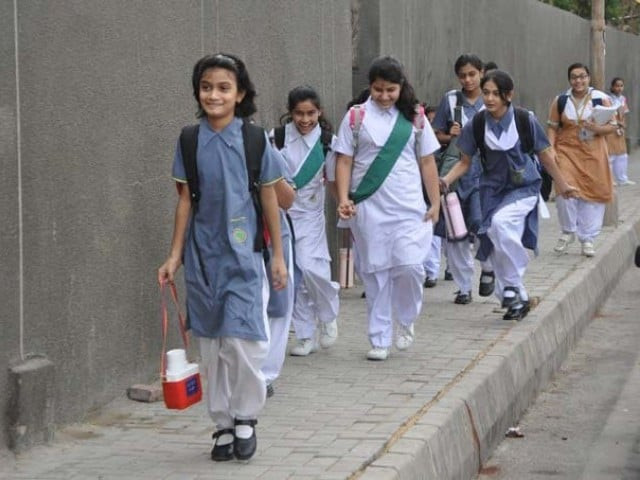Maths, science education: Rawalpindi’s schools lag behind others in Punjab
Average scores for classes V and VIII are below mean provincial figures

Lawmakers unite on making education for girls a political priority. PHOTO: EXPRESS/FILE
This was disclosed in a study by Alif Ailaan and recently launched in Rawalpindi. Alif Ailaan had collaborated with the Sustainable Social Development Organisation (SSDO) and the Pakistan Science Club to launch the district report at the Government Muslim Higher Secondary School on Saidpur Road.
According to the Punjab Examinations Commission (PEC) 2016 results, the average mathematics scores for class V were 53 per cent, while average science scores for class V were 48 per cent.
In Rawalpindi district, the 2016 PEC results show that the provincial average scores for mathematics for class V were 52 per cent, while the average scores for science for class V were 46 per cent.
These scores were lower than the provincial average of the province.
According to PEC 2016 results, average mathematics scores for class VIII was 42 per cent. This places Rawalpindi at 31 out of 36 districts of the Punjab.
Similarly, the average scores for science in Class VIII were 45 per cent, placing the district at number 32.
Moreover, the study showed that 48 per cent of class V students could not successfully attempt two-digit divisions, which are supposed to be mastered at the class III level. This reveals an alarming state of mathematics education in Rawalpindi.
District education officials pledged to uplift standards of mathematics and science education at the event.
Qazi Zahoorul Haq, the former Rawalpindi Executive District Officer and now the Rawalpindi District Education Authority’s Chief Executive Officer, said that around 80 per cent of teachers recruited are for teaching science subjects.
Addressing the issue of subject specialist teachers and education department officials, Haq said they would seek help from non-governmental organisations to introduce technology-based teaching methods for mathematics and science.
He also agreed to nominate a focal person on mathematics and science who would assist the district education authority on improving the state of students studying these two key subjects.
Provincial lawmakers Raja Hanif, Zaibunnisa Awan and Lubna Rehan appreciated the PSC for demonstrating fun science activities for school kids.
The parliamentarians were of the view that mathematics and science education play a vital role in powering the nation and that there was a need to invest more resources in these subjects.
After the report’s launch, PSC organised a science fair which showcased interesting scientific experiments. Powering Pakistan for the 21st Century is a three-volume document compiled by researchers and education activists mobilised by the Pakistan Alliance for Mathematics and Science (the Alliance), under the patronage of a range of government and non-government organisations.
The study’s purpose was to highlight the importance of mathematics and science education in the country’s classrooms, especially those in government schools, where the least privileged of this country’s children study.
In doing so, the Alliance sought a robust set of actions by the government, both at the federal and provincial levels, to help transform mathematics and science education in Pakistan.
Published in The Express Tribune, April 2nd, 2017.



















COMMENTS
Comments are moderated and generally will be posted if they are on-topic and not abusive.
For more information, please see our Comments FAQ